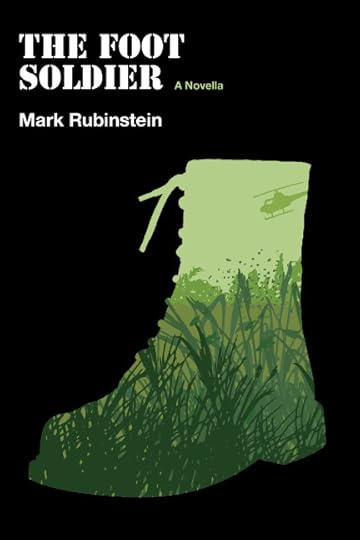Mark Rubinstein's Blog, page 30
February 19, 2014
“I Have Forty Paid Enemies”
 Hell would freeze over before I’d do any cooking back then—especially since I lived alone in Manhattan. So I ate out every night.
Hell would freeze over before I’d do any cooking back then—especially since I lived alone in Manhattan. So I ate out every night.
I got to be friendly with some restaurateurs. One in particular, Jerry, owned a fancy steak house. Jerry was always ready with a handshake and a slap on the back. I was a “regular” who hunkered down on New York strip steak at least twice a week. Jerry usually comped me a glass of wine or an after-dinner drink. You see, Jerry was a great guy—and he was “connected”
Jer...
February 18, 2014
Plugged In and Feeling the Fiction

Imagine wearing a vest-like device while reading a book, so that when you come upon a scene brimming with heart-racing tension, the vest emits vibrations to increase your heart rate and compresses your ribcage to convey the tightness felt by the protagonist in the throes of his peril.
Sounds like the stuff of science-fiction, but it is not.
An intriguing article described MIT scientists developing a vest with programmable LEDs, so one can experience physical sensations while reading fiction.
Although this device in its current form is crude and unwieldy, the quest to produce such a gadget says plenty about our culture’s attempt to harness technology and enhance human experience.
Is this a worthwhile pursuit?
Through powerful writing, good fiction creates both emotional and physical reactions. Words provide images in the reader’s mind, which are transformed into feeling states ranging from revulsion, rage and despair, to empathy, nostalgia and love.
Haven’t we all experienced physical sensations triggered by the imagination’s link to the written word? While reading the terrible choice Sophie was forced to make in the death-camps (Sophie’s Choice), did we need an external contraption to feel tears or a lump in our throats? To feel aroused while reading Fifty Shades of Grey, did we need a strap-on device to experience sexual tinglings?
No.
The human mind is pre-programmed to provide physical and emotional reactions to the word-pictures found on a page.
As a psychiatrist, I know the amygdala within the brain’s limbic system regulates memory and emotion, processing everything conveyed by the written word.
As a novelist, I know my task is to provide the reader with a richly textured story to evoke many feelings.
Must we further enhance fictional experience with technology? Do we want to feel a jolt of searing pain when a character is stabbed or shot; and do we wish to double-up in agony when Jack Reacher is on the receiving end of a solid punch to the gut?
I don’t think so.
This MIT project raises other questions.
Is the increasing digitalization of our world altering our humanity? Must we don a vest or implant a subcutaneous chip to experience our natural sensations and feelings? Will we someday have programmable emotions because our capacities have atrophied to the point of unresponsiveness? Is this emblematic of the numbing-down of our specie?
I’m not a troglodyte, but I think the very technologies meant to enhance communication are paradoxically diminishing real interaction. We text rather than talk. We e-mail instead of telephoning. Some people live virtual lives—they’ve become avatars—meeting and having sex online. Are these “real” relationships?
As for boosted reading—augmenting sensations and emotions—I’ll rely on my imagination to see, hear, feel, smell and appreciate the sights, sounds, and feeling states an author is conveying. I neither want nor need technologic enhancement to experience fully the magical world of a well-written novel.
Plugged In and Feeling the Fiction

 Imagine wearing a vest-like device while reading a book, so that when you come upon a scene brimming with heart-racing tension, the vest emits vibrations to increase your heart rate and compresses your ribcage to convey the tightness felt by the protagonist in the throes of his peril.
Imagine wearing a vest-like device while reading a book, so that when you come upon a scene brimming with heart-racing tension, the vest emits vibrations to increase your heart rate and compresses your ribcage to convey the tightness felt by the protagonist in the throes of his peril.
Sounds like the stuff of science-fiction, but it is not.
An intriguing article http://tinyurl.com/Inauojd described MIT scientists developing a vest with programmable LEDs, so one can experience physical sensation...
February 15, 2014
A Shot in the Dark
Tales from the Couch
Seeing the patient from psychiatry’s perspective
by Mark Rubinstein, M.D.
 It was 5:00 PM on a cold winter evening. I’d testified at a Workers’ Compensation hearing and was walking toward my car with an attorney. We were the only two people on a lonely, narrow street. The stores were shuttered. The neighborhood was in a devastated section of Bridgeport, Connecticut.
It was 5:00 PM on a cold winter evening. I’d testified at a Workers’ Compensation hearing and was walking toward my car with an attorney. We were the only two people on a lonely, narrow street. The stores were shuttered. The neighborhood was in a devastated section of Bridgeport, Connecticut.
Suddenly, coming from across the street and down the block, we heard the cracks of two shots from a small-calibe...
February 14, 2014
Storytelling Makes Us Who We Are, Novelist Tells Rotarians: Article in the Westport Minuteman
 “I always wanted to be a writer,” retired forensic psychiatrist Mark Rubinstein told Westport Sunrise Rotary last Friday. “People were telling me stories all the time … that’s partially why I went into psychiatry.”
“I always wanted to be a writer,” retired forensic psychiatrist Mark Rubinstein told Westport Sunrise Rotary last Friday. “People were telling me stories all the time … that’s partially why I went into psychiatry.”
Now he’s the storyteller, enjoying his second career, recalling 42 years of “listening to people’s tales of woe,” and working on his fifth novel.
Storytelling, he said, “makes us who we are … the novelist seeks to capture the reader, to take him from his prosaic world to one that giv...
February 10, 2014
Silence Once Begun: A Conversation with Jesse Ball
Jesse Ball’s new novel Silence Once Begun has just been released by Pantheon. His three previous novels are The Way Through Doors, Samedi the Deafness, and Curfew. He’s also written several works of verse. He won the 2008 Paris Review Plimpton Prize and is the recipient of a 2014 National Endowment for the Arts Creative Writing Fellowship. He teaches at the Art Institute of Chicago’s MFA Writing Program.
Silence Once Begun concerns a Japanese fishing village where eight elderly residents have...
February 6, 2014
Review of "The Foot Soldier"
So when I come across something like Mark Rubinstein’s “The Foot Soldier,” where he is able to take the reader inside of a war, inside of a humid jungle full of mosquitoes and predators and booby traps and probably most of all fear, I’m beyond captivated.
Though it was a short read–less than an hour–I felt the pain of young Costa every step of the way, especially to the heart-breaking decision at the end. There are choices we have to make in our lives that are so mind-blowing, we can’t even comprehend them at that second. I think no one knows the meaning of that sentence better than the men serving in our forces, the ones who make hard choices every single day.
So–was this the best book about war I’ve ever read? No. Was the ending the best it could have been? Not really.
But did it grip me emotionally?
Absolutely. I nearly choked trying to hold back tears while reading certain passages. My body tensed up subconsciously as I read with a fast pace about Costa’s journey serving “point.”
I’m done with the book and my nerves are frayed, my thoughts are scattered, and I’m anything but calm. That’s what makes a good story.
Chelsea Woodring
Net Galley Reviewer
Review of “The Foot Soldier”
I admit, I initially picked this book to read thinking it would serve as an “easy” read in-between all the non-fiction on my reading list. I’m a bit of a war fanatic in the sense that I appreciate reading war materials, come from a military family that has served in several wars, and have worked with veterans. Still, I’ve never been in a war. So when I come across something like Mark Rubinstein’s “The Foot Soldier,” where he is able to take the reader inside of a w...
February 4, 2014
A Good Story is Disturbing
 As David Mamet told me, “If Hamlet comes home from school, and his dad’s not dead, and asks him how school was, it’s boring.”
As David Mamet told me, “If Hamlet comes home from school, and his dad’s not dead, and asks him how school was, it’s boring.”
As a psychiatrist and novelist, I’m aware that all good stories are disturbing. No matter how beautifully written or “literary,” a novel resonates deeply because the storyline tugs powerfully at us. It upsets, confounds and presents chaos, conflict, imbalance and upheaval — either within its character’s mind or circumstances.
As readers, we crave instability, disturbance...
January 31, 2014
Sex with a Former Patient
The temptations of the profession
Some years ago when I was single, Eva G began psychotherapy. She was unhappy because she was repeatedly involved in ungratifying relationships with men who were at least 20 years her senior. She was quite attractive, bright, articulate, and wanted to understand her need to date older men.
The psychotherapy continued once-weekly for about seven months. She quickly developed insight into the dynamics of her choices in men, and began making better decisions in her...





